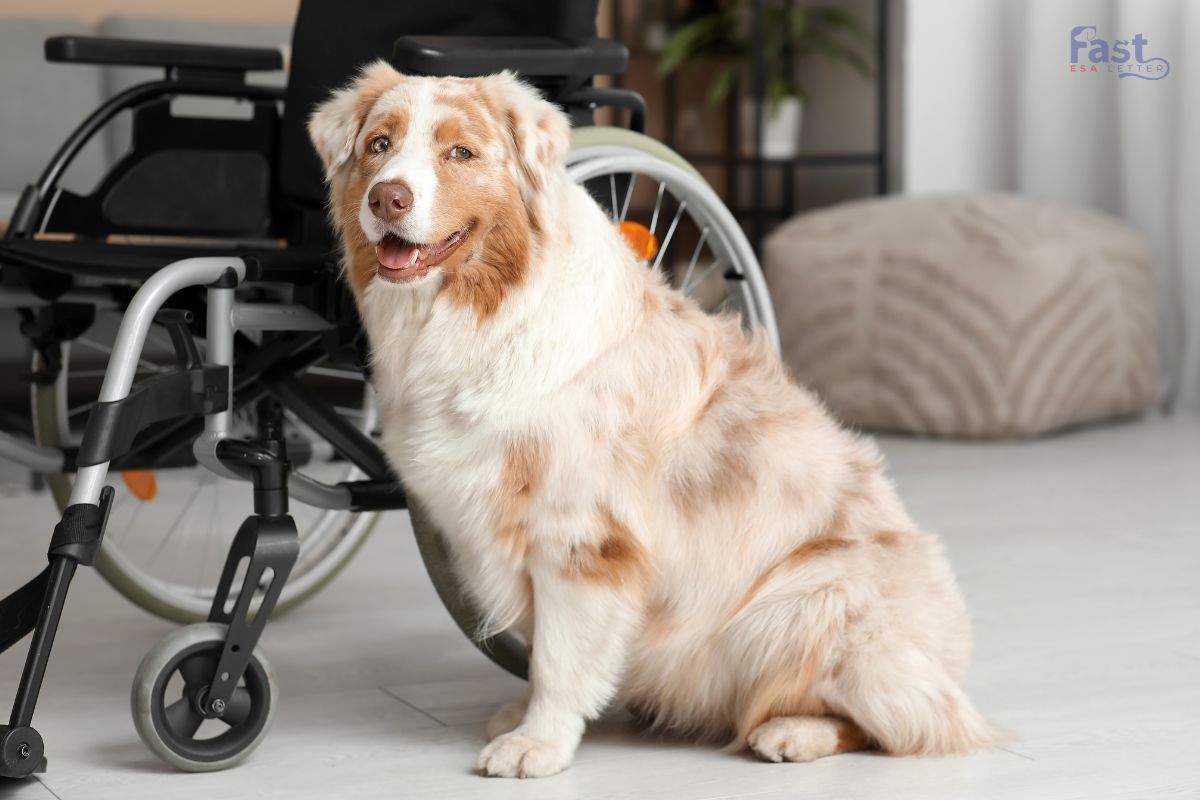How to Get a Psychiatric Service Dog in Massachusetts?

Key Points
- Definition: A psychiatric service dog is a specially trained dog that assists individuals with mental health conditions.
- Benefits: They provide emotional support, practical assistance, and help mitigate symptoms.
- Legal Rights: You have specific legal rights and protections under federal laws such as the FHA, ADA, and ACAA.
- Get a PSD Recommendation Letter: Request a recommendation or prescription letter from your mental health professional stating that you require a psychiatric service dog to assist with your condition.
- Select the Right Dog: Choose a dog with the appropriate temperament, size, and trainability for your needs. Breeds like Labrador Retrievers, Golden Retrievers, and Poodles are popular choices for PSDs, but any breed can be trained.
- Ensure Proper Task Training: The dog must be trained to perform specific tasks that help with your psychiatric condition, such as interrupting anxiety attacks, providing deep pressure therapy, or reminding you to take medication.
What is a Psychiatric Service Dog?
Am I Eligible For a PSD in Massachusetts?
- Agoraphobia
- Autism
- Attention-Deficit/Hyperactivity Disorder (ADHD)
- Bipolar Disorder
- Anxiety Disorders
- Depression
- Obsessive-Compulsive Disorder (OCD)
- Panic Attacks
- Claustrophobia
- Post-Traumatic Stress Disorder (PTSD)
- Schizophrenia, and many more.
What are the Psychiatric Service Dog Training Requirements in Massachusetts?
Self-Training Program
While formal service animal training programs exist, they can be expensive, and the ADA gives you the right to train your animal yourself. Self-training allows you to customize your dog’s training, but it requires time, dedication, and patience. Start with basic obedience commands such as sit, stay, or come, then move to task-specific training like alerting to anxiety attacks and public access training to ensure your dog behaves well in various environments.
Professional Service Dog Training Programs
If you prefer not to self-train your dog, there are several professional trainers who specialize in psychiatric service dog training in Massachusetts. They will ensure your dog is well-trained in performing specific tasks related to your psychiatric condition and behaves appropriately in public.
Places to Find Professional Dog Trainers in Massachusetts:
Hybrid Training Programs
Adopt a Trained Psychiatric Service Dog
If you’re unable to commit to self-training or prefer not to go through the extensive training process, you can adopt a fully trained psychiatric service dog. Several organizations specialize in training and placing service dogs with individuals who need them for mental health support.
Places Where You Can Adopt Psychiatric Service Dogs in Massachusetts:
How Can I Get A Psychiatric Service Dog In Massachusetts?
- Ensure Your Dog is Trained:
The dog must be trained to perform tasks related to your disability to assist you and comply with legal standards effectively. - Book an Appointment with a Mental Health Professional:
Schedule an appointment with a licensed mental health professional, such as a psychiatrist or psychologist. - Attend Evaluation or Consultation:
During your consultation, discuss how a PSD could assist you in managing your condition. - Obtain Your PSD Letter:
Once you have completed the necessary steps, you will receive a PSD letter from your mental health professional. This letter officially designates your dog as a psychiatric service dog and outlines your specific needs and the tasks your dog is trained to perform.
What Rights Do My PSD and I Have in Massachusetts?
Fair Housing Act
The Fair Housing Act (FHA) provides coverage for assistance animals in housing situations. Under this Act, individuals with a psychiatric service dog are entitled to live in property regardless of pet policies. With a valid PSD letter, you are not required to pay additional fees or charges, even in housing that enforces a no-pet rule.
Public Access Rights
- Hotels, motels, and other lodging establishments
- Places that sell food and beverages, such as restaurants and food stalls
- Any public gathering spaces, like theaters or shopping malls
- Amusement parks, educational institutions, and museums
- Terminals, depots, and stations
Protection for Service Dogs on Transportation
Educational Facilities
What to Do If You Have Been Discriminated Against?
- Within 180 days of the alleged discriminatory act with the U.S. Department of Justice.
- Within 300 days with the Massachusetts Commission Against Discrimination.
Do I Need to Register My Psychiatric Service Dog in Massachusetts?
How Much Does It Cost to Get a Psychiatric Service Dog in Massachusetts?
What Are the Top 5 Things to Consider While Selecting the Best Psychiatric Service Dog?
Selecting the best psychiatric service dog is a crucial decision. Here are some factors to consider:
- Temperament and Training:
Look for a dog with a calm, gentle, and patient temperament. Ensure the dog has undergone rigorous training to perform specific tasks related to your mental health condition. - Personality Match:
Consider your personality and lifestyle to find a dog that complements your needs. For example, a high-energy dog may be a great fit if you’re active and enjoy outdoor activities. - Seek Advice:
Consult with mental health professionals or other individuals who have experience with psychiatric service dogs for guidance. - Evaluate Trainability
Whether you are adopting a dog or working with a professional service dog provider, it’s crucial to ensure the dog can be trained to perform the tasks you need. - Health and Physical Condition
Thoroughly assess the dog’s health and physical condition. A psychiatric service dog needs to be physically fit to perform tasks reliably over an extended period.
Top 5 Dog Breeds for the Psychiatric Service Dog Role in Massachusetts
1. Golden Retriever
2. Labrador Retriever
3. German Shepherd
4. Standard Poodle
5. Bernese Mountain Dog
Bottom Line
Getting a psychiatric service dog is a manageable process, although it can be time-consuming. Ensure that the dog is properly trained to assist with your medical conditions, then consult a healthcare professional to obtain a PSD letter, which states that you need the assistance of a service dog. Certain dog breeds, such as Golden Retrievers, German Shepherds, and Bernese Mountain Dogs, are well-suited for this role. To select the best one for you, consider your lifestyle and budget. Consulting a professional dog trainer or your doctor will help you make the right decision.
Frequently Asked Questions (FAQs)
What Happens If My Psychiatric Service Dog Misbehaves In Public?
Can A Psychiatric Service Dog Be Any Breed?
Yes, any dog breed can be trained as a psychiatric service dog. The dog’s temperament, size, and ability to perform the required tasks are more important than the breed itself.
Can I Bring My Psychiatric Service Dog To Work In Massachusetts?
Do Psychiatric Service Dogs Need To Wear A Vest Or ID In Massachusetts?
No, psychiatric service dogs are not required to wear a vest or have an ID by law. However, many owners choose to use vests to indicate that the dog is working, which can help avoid confusion in public spaces.
Can A Minor Get A Psychiatric Service Dog?
Can I Take My PSD To Another State?
Post Author
Prince Sharma
Related Articles
Man With Schizophrenia Manages Symptoms With The Help Of A Psychiatric Service Dog
How PSD Helps Manage Symptoms of Schizophrenia?A Psychiatric Service Dog helps manage schizophrenia symptoms by providing emotional support, grounding the individual during hallucinations, and assisting in crisis situations. PSDs offer stability...
Why Do You Need a Psychiatric Service Dog ID Card?
Why Do You Need a Psychiatric Service Dog ID Card?A psychiatrist service dog ID card is not required by the ADA, but it can be helpful in communicating to others that your dog is a trained service animal. A PSD Letter makes it possible.In...
Anxiety and Psychiatric Service Dogs: What You Need To Know.
How Psychiatric Service Dogs Help Manage Anxiety: A Complete GuidePsychiatric service dogs help manage anxiety by providing emotional support and performing specific tasks tailored to their handler's needs. They can detect early signs of anxiety,...
Live and Fly Free with Your PSD!






